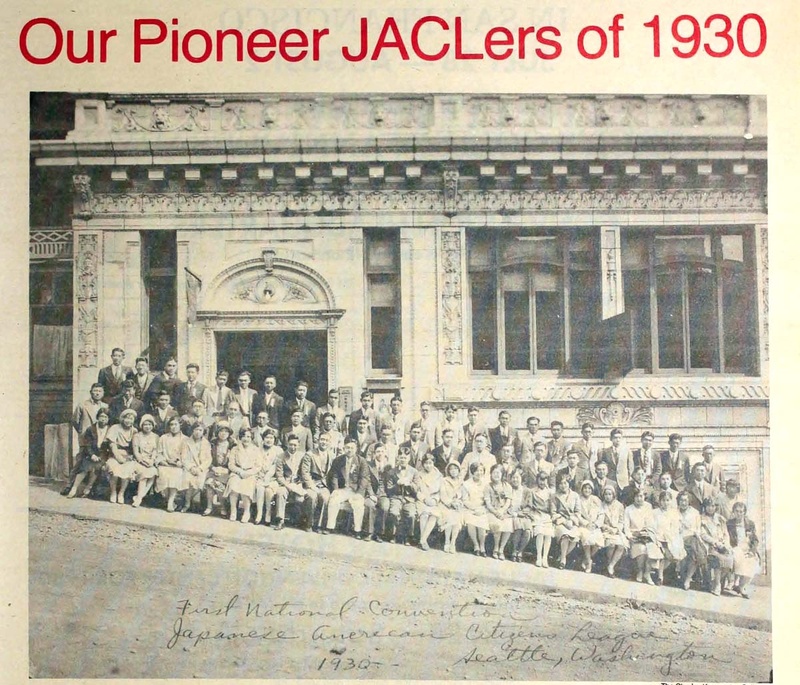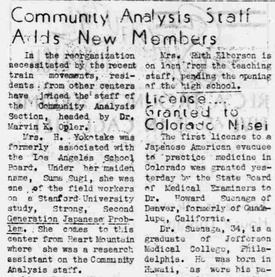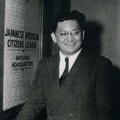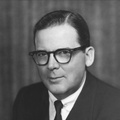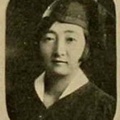Upon her return to Los Angeles, the Los Angeles JACL and the Rafu Shimpo feted Sugi’s successful lobbying efforts. The papers particularly noted the fact that Hiram Johnson, a noted anti-Japanese politician, voted in favor of the bill. Sugi’s lobbying served as a valuable test for future lobbying efforts. The Rafu Shimpo commissioned Sugi to write a column about her experiences in Washington.
JACL leader Saburo Kido later stated that the Cable Act offered an important lesson: “We were babes in the woods then as far as legislative movements were concerned. JACL was not able to be included in the council groups pushing the amendment to bring equality to women citizens…The fact that the chief beneficiaries of this amendment would be of Japanese ancestry was injected by JACL to present one facet of the picture.”
Bill Hosokawa noted in his book JACL In the Quest of Justice, remarked positively about Sugi’s trip: “there is no denying the fact that a representative of JACL had gone to Washington and pleaded successfully for a bill of special interests to the organization. And she had set a precedent of sorts by working on a minimal budget, letting the merits of her cause do the talking.”
Journalist and historian Togo Tanaka, a close friend of Sugi, also described her early lobbying efforts for the JACL as groundbreaking. However, women married to noncitizens could regain their citizenship by taking a loyalty oath.
The lobbying campaign catapulted Sugi into stardom among the Nisei. In the months that followed, she spoke at several JACL chapters across the West Coast describing the success of her campaign. At one point, in August 1931, she was named JACL representative at an event welcoming a group of wrestlers from Japan.
As part of the leadership of the JACL Los Angeles chapter, Sugi helped organize the 1932 National Convention in Los Angeles. In July 1932, while at the convention, she was nominated to be president of the national JACL, although she lost to Dr. Terry T. Hayashi. It would not be until 1992 when the JACL elected its first woman president, Lillian Kimura.
Sugi’s success also motivated others to follow suit and lobby Congress. In 1935, Tokutaro Nishimura Slocum, a World War I veteran of the 82nd Division, went to Congress to lobby for the creation of a bill to grant citizenship to “oriental” World War I veterans. Initially, the U.S. Army offered immigrants who were banned from receiving citizenship with the chance to become citizens after serving in the Army during the war.
Hundreds of immigrants from East Asia and the Middle East enlisted and fought in France. When they returned, they learned that their offers of citizenship were rescinded. As Slocum was among one of the founding members of the American Legion, he used his influence among World War I vets to push various members of Congress to draft a bill. In 1935, the Lee-Nye Act was passed and signed by President Roosevelt, granting Issei veterans like Slocum with citizenship.
On January 27, 1936, Sugi married Hitoshi Yokotake, an ice salesman and sumo wrestler. The couple had two children: a son, Makoto, and daughter, Shizuye. Although Suma reduced her involvement in the JACL around this time, she remained active in several social clubs, namely the Hawaii Club, and occasionally contributed to the Rafu Shimpo.
On December 22, 1939, Suma Yokotake penned an article decrying the inability of several qualified Nisei women to find jobs as teachers in the Los Angeles school system. She argued in her article that “the Nisei has one strike against him with physical difference when he is being introduced or interviewed.” Suma pointed out that among the five Nisei who worked for the LA school system, all worked in secretarial or custodial positions despite having the qualifications to be teachers. She promised readers that “one of these days there will be a Nisei employed as a teacher in the Los Angeles School system.”
Following the declaration of Executive Order 9066 on February 19, 1942, Suma was fired from her job with the Los Angeles Board of Education. In April 1942, the Army sent Suma and her family to the Pomona Assembly Center. At the Pomona Assembly Center, Suma worked for the camp school staff. Her husband Hitoshi served as a sumo instructor and organized wrestling matches. A few months later in September 1942, the Yokotake family was transferred to the Heart Mountain Concentration Camp in Wyoming.
At Heart Mountain, Suma continued her work in education even as Hitoshi became a police officer in Internal Security. In February 1943, Hitoshi became assistant chief of police at Heart Mountain.
In October 1943, Suma left Heart Mountain for Tule Lake to work as a research assistant to Dr. Marvin Opler in the camp’s community analysis section, where she studied the effects of segregation on the community. The Tulean Dispatch noted Suma’s previous work with the 1930 Stanford study as part of her qualifications. Suma remained at Tule Lake until the camp’s closure, and returned to Los Angeles afterwards.
In the years after the war, Suma Yokotake remained active in local politics in Los angeles. In March 1947, the African American newspaper The Los Angeles Tribune reported that Suma Yokotake was appointed as a board member for the Los Angeles chapter of the National Urban League. In July 1962, the JACL honored Suma Sugi Yokotake with a special commendation for her work as the JACL’s first lobbyist. Although Suma’s name occasionally appeared in the Japanese American press in reference to her 1931 lobbying campaign, she largely disappeared from the public eye.
In July 1962, Saburo Kido wrote in the Shin Nichibei a piece lauding the accomplishments of Suma and Tokie Slocum: “It was a coincidence, that Slocum and Miss Sugi added glamour to our life during those days because they were the first lobbyists to go to Washington to espouse the cause for persons of Japanese ancestry without any official status as a government representative. They were plain citizens who had a message to present to Congress.”
Even in retirement, Suma remained a lobbyist. In October 1967, Suma worked with the California State Assembly to pass a bill, AB 1607, that would allow Nisei state employees who worked before the war to claim retirement benefits in the form of “war relocation leave” credits. Suma was included as a recipient for her work for the Los Angeles City School system from before and after the war.
Suma Sugi Yokotake died on November 26, 1980 in Los Angeles. Among the Nisei who helped found Japanese American Citizens League, few had as much impact as Suma Sugi. Through her work with Congress, she demonstrated the importance of lobbying as a means of enacting legislation that benefited the community and established a pattern that was repeated by Tokutaro Nishimura Slocum in 1935 with his bill for Issei veterans, and by Mike Masaoka in the postwar years. Lastly, her work to challenge legal and social obstacles that prevented Nisei women from advancing in their careers as educators made her a model for other women combatting discrimination.
© 2024 Jonathan van Harmelen


